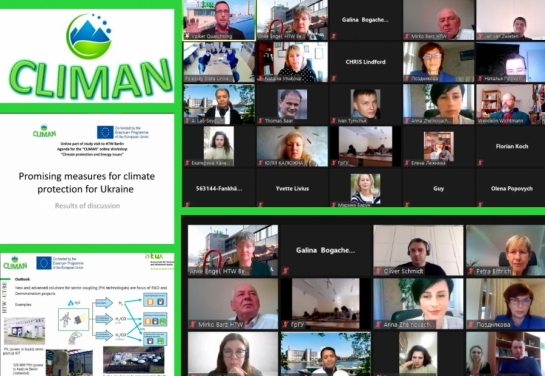Olena Bielova, Deputy Head, Senior Lecturer of Business Administration and Project Management Department; Olena Naumova, Associate Professor of Marketing and Behavioral Economics; Andrii Lotariev, Head of International Office and Halyna Bohachenko, Project Manager participated in the event.
Experience of HTW Berlin - University of Applied Sciences was presented by the leading university scientists, professors, researchers and representatives of partner universities from Ukraine, Belarus and Georgia in the direction of implementation of scientific high-tech climate-oriented research, training of students of Master Degree Programs, Doctoral and Postdoctoral studies; presented various topics that covered both general issues of the main ways of preserving the climate in technical, social and educational aspects, as well as specific highly specialized organizational and technological measures.
Professor M. Bartz in his report «Energy Economics as a Central Challenge to Climate Protection» revealed a system-oriented approach to the use of energy resources of the planet, taking into account their carbon contribution in the context of environmental problems and the global crisis of traditional carbon fossil fuels. Professor Koch presented the results of his own research on the application of approaches to sustainable development of urban areas in the context of energy saving, improving the organizational structure of environmental, including climate, local governance and stressed the importance of organizing and developing cooperation under the Global Sustainable Development Goals. Professor Lass-Seium outlined the prospects for the production and use of hydrogen technologies in industry and transport to reduce overall energy consumption and anthropogenic impact on environmental components in the report «Hydrogen technologies - benefits and challenges». The prospects for using «natural solutions» to stimulate agricultural development in peatlands and swamps to mitigate the effects of climate change were outlined in a report by Dr. Wichtmann of the Institute of Botany and Landscape Ecology at the University of Greifswald. The presented reports revealed as widely as possible all aspects of the climate-oriented activities implementation in the world and the experience of Germany, which was very useful for participants from Ukraine, the Republic of Belarus and Georgia.
As a result of a very informative study visit, representatives of Ukraine, Georgia and the Republic of Belarus developed and presented promising measures to protect the climate in their countries and discussed the results to achieve a common position on the abovementioned issues.
Such study visits are very useful for stimulating of both educational and research processes at partner universities, because only on the basis of international and intersectoral experience exchange in scientific and educational aspects, the synergistic effect to solve global problems of mankind can be achieved.
We would like to express our sincere gratitude to the entire HTW Berlin team for the wonderful organization of such a useful and bright event!
In recent decades, environmental problems related to anthropogenic impact on the environment have become increasingly acute and lead to the need for the formation and systematic implementation of environmentally-oriented activities at both national and global levels. Among all global environmental problems, the problem of climate change and, as a consequence, the transformation of ecosystems at all levels has a special place, which highlights the need to study climate-oriented processes and develop approaches to climate change mitigation in organizational, technological, legislative, educational directions, etc.
The CLIMAN project is dedicated to solving the educational issue of training climate-oriented specialists for various sectors of the economy. The aim of the project is to help the universities of Georgia, the Republic of Belarus and Ukraine to become centers for the development of research of climate management to accelerate integration into the global climate market and to meet global climate regulation requirements by acquiring best European practices in the field of climate change prevention, adaptation and mitigation.
The Project is co-funded by the Erasmus+ Program of the European Union.









